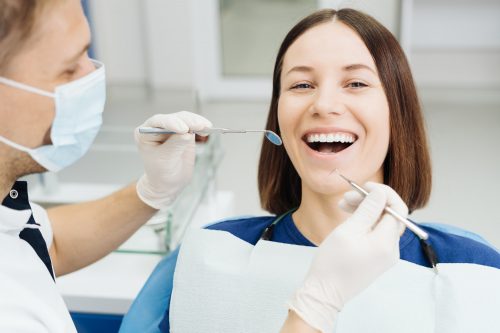When it comes to dental emergencies, being prepared can make all the difference in ensuring prompt care and minimizing potential damage. Whether it’s a broken tooth, a severe toothache, or a lost filling, dental mishaps can happen unexpectedly and often leave us feeling worried and uncertain. That’s why in this blog post, in partnership with a dentist in Spokane Valley, we will delve into the world of dental emergency preparedness and provide you with essential information on what to do when these situations arise.
Common Dental Emergencies

When dental emergencies strike, knowing how to respond promptly can alleviate anxiety and pave the way for effective care. Let’s explore some of the most common dental emergencies and guide you through the necessary steps to take in each situation. Remember, remaining calm and following these guidelines can make a significant difference in the outcome of your dental emergency.
A. Broken or Chipped Tooth
A broken or chipped tooth can occur due to various reasons, such as accidental falls, sports injuries, or biting down on hard objects. If you find yourself facing this dental mishap, here’s what you should know:
1. Causes and Symptoms:
The causes of a broken or chipped tooth may vary, but the symptoms often include sharp edges, pain, sensitivity to hot or cold, and possible bleeding if the injury is severe.
2. Immediate Steps to Take:
- Rinse your mouth with warm water to clean the area.
- If there is bleeding, apply gentle pressure with clean gauze or a cloth.
- If you have the broken piece, rinse it with water and keep it in a clean container.
- Use a cold compress on the affected area to reduce swelling.
3. When to Seek Professional Help:
It’s crucial to contact your dentist as soon as possible, even if the injury seems minor. They will assess the damage, provide appropriate treatment, and prevent any further complications.
B. Knocked-out Tooth
Having a tooth knocked out can be a distressing experience, but quick action can potentially save the tooth. Follow these steps if you or someone you know has a knocked-out tooth:
1. Causes and Symptoms:
A knocked-out tooth can result from accidents, trauma, or sports-related injuries. The symptoms include a missing tooth, bleeding, pain, and swelling.
2. Immediate Steps to Take:
- Handle the tooth by the crown (the visible part) and avoid touching the root.
- Rinse the tooth gently with water if it’s dirty. Do not scrub or remove any tissue fragments.
- Try to reinsert the tooth into its socket, if possible.
- If reinsertion is not feasible, place the tooth in a container of milk or a tooth-preservation solution recommended by your dentist.
3. When to Seek Professional Help:
Time is of the essence with a knocked-out tooth. Contact your dentist immediately or head to an emergency dental clinic for urgent care. The chances of saving the tooth are higher when swift action is taken.
C. Toothache or Severe Tooth Pain
Toothaches can range from mild discomfort to excruciating pain and are often indicative of an underlying issue. If you’re dealing with a toothache or severe tooth pain, here’s what you should consider: 
1. Causes and Symptoms:
Toothaches can be caused by various factors, including tooth decay, gum infection, tooth sensitivity, or dental abscess. The symptoms may include persistent pain, sensitivity to hot or cold, swelling, or a foul taste in the mouth.
2. Immediate Steps to Take:
- Rinse your mouth with warm water to cleanse the area.
- Gently floss around the affected tooth to remove any trapped debris.
- Use a cold compress outside your cheek to alleviate swelling and pain.
- Over-the-counter pain relievers may provide temporary relief but avoid applying them directly to the gums or tooth.
- If you have Invisalign in Spokane Valley, it’s important to remove the aligners before taking these steps to address the dental issue.
3. When to Seek Professional Help:
It’s essential to schedule an appointment with your dentist if the toothache persists for more than a day or is accompanied by fever, swelling, or difficulty swallowing. These symptoms may indicate a more severe underlying condition that requires professional attention.
D. Lost Dental Filling or Crown
A lost dental filling or crown can expose the underlying tooth, leading to sensitivity and discomfort. If you find yourself in this situation, follow these steps:
1. Causes and Symptoms:
Dental fillings or crowns may become dislodged due to wear and tear, biting on hard foods, or accidental trauma. Symptoms can include a noticeable gap or sensitivity in the affected tooth.
2. Immediate Steps to Take:
- If possible, keep the lost filling or crown in a safe place.
- Gently clean the exposed tooth with warm water and avoid chewing on that side.
- Over-the-counter dental cement or temporary filling material can be used to cover the tooth temporarily.
3. When to Seek Professional Help:
Contact your dentist as soon as possible to have the filling or crown replaced or repaired. Leaving the tooth unprotected can lead to further damage or infection.
E. Object Stuck Between Teeth
Getting an object stuck between your teeth can be uncomfortable and potentially lead to pain or gum irritation. Follow these steps to address this situation:
1. Causes and Symptoms:
Objects such as food particles, popcorn kernels, or dental floss can become wedged between teeth, causing discomfort and difficulty in removing them.
2. Immediate Steps to Take:
- Gently try to remove the object using dental floss. Be cautious not to force it, as it may lead to injury or further lodging.
- Rinse your mouth with water to dislodge any loose debris.
3. When to Seek Professional Help:
If the object remains stuck or causes significant pain, do not hesitate to seek assistance from your dentist. They have the tools and expertise to safely remove the object and ensure the health of your teeth and gums.
REMEMBER:
While these immediate steps can provide temporary relief, it is crucial to reach out to your dentist for professional evaluation and appropriate treatment. They will address the underlying causes, prevent further complications, and guide you towards a full recovery.
Dental Emergency Preparedness
Being prepared for dental emergencies is like having a safety net that can help you navigate through unexpected dental mishaps with confidence and ease. Learn about the crucial elements of dental emergency preparedness, empowering you to take control of the situation should an emergency arise. Remember, being well-prepared can make all the difference when every second counts.
A. Create a Dental Emergency Kit
One of the key components of dental emergency preparedness is having a well-stocked dental emergency kit readily available. This kit should contain essential items that can provide temporary relief and protection until professional dental care can be sought. Consider including the following items:
List of Essential Items:
- Gauze pads or rolls to control bleeding
- Temporary filling material to cover a lost filling or crown
- Dental wax to ease discomfort from sharp edges or orthodontic appliances
- Over-the-counter pain relievers suitable for dental use
- Disposable gloves to maintain hygiene during first aid procedures
- Small container with a lid to hold a knocked-out tooth or restoration
- Dental floss for removing objects stuck between teeth
Having a dental emergency kit within easy reach allows you to respond promptly and efficiently when a dental mishap occurs. It provides you with the necessary tools to manage pain, protect the affected area, and potentially preserve a dislodged tooth or restoration. By assembling and maintaining a dental emergency kit, you can be better prepared to address dental emergencies as they arise.
B. Know Your Dentist’s Contact Information
When facing a dental emergency, time is of the essence. Therefore, it’s vital to have your dentist’s contact information readily accessible. Here’s what you need to keep in mind:
Save your dentist’s phone number in your phone’s contacts for quick and convenient access. In addition, consider keeping a printed copy of the contact information in your wallet, purse, or posted on your refrigerator. By having these details at your fingertips, you can swiftly reach out for guidance and arrange for urgent dental care when necessary.
C. Understand Basic First Aid for Dental Emergencies
Having a basic understanding of first aid for dental emergencies can empower you to take immediate action, alleviate pain, and minimize potential complications. Here are some general guidelines to keep in mind:
- Stay calm and assess the situation.
- Cleanse the affected area with warm water or saline solution.
- Control bleeding by applying gentle pressure with gauze or a clean cloth.
- Protect sharp edges with dental wax.
- Preserve a knocked-out tooth in milk or a tooth preservation solution.
- Use over-the-counter pain relievers for temporary relief, as directed.
During a dental emergency, it’s natural to feel anxious or alarmed. However, staying calm allows you to think clearly and take the necessary steps to address the situation effectively. Acting swiftly, following proper first aid techniques, and promptly seeking professional dental care can help mitigate potential complications and increase the chances of a positive outcome.
Your Emergency Dentist in North Spokane & Spokane Valley, WA
Are you in need of immediate dental care for a dental emergency? At Avenue Dental Care, we’re here to help. Our experienced team is equipped to handle a wide range of dental emergencies, providing prompt and compassionate care when you need it most.
Contact us now to schedule an emergency dental appointment at our offices conveniently located in North Spokane and Spokane Valley, WA. Don’t wait – our team is ready to address your dental emergency and provide the relief and treatment you deserve. Walk-ins and emergency appointments are available! Your oral health is our priority.

North Spokane
755 East Holland
Spokane, WA 99218
(509) 467-8000
Spokane Valley
20 N. Evergreen, Ste 101
Spokane Valley, WA 99216
(509) 926-1500

